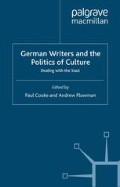Abstract
According to Michel Foucault, the confession is one of the West’s ‘most highly valued techniques for producing truth’.1 At the end of the nineteenth century, sexual confessions produced the truth about perversions, much in the same way that religious confessions produced the truth about sin. At the end of the twentieth century too, a confession of involvement with the Stasi was generally seen to speak the truth about life in the GDR. Unless, of course, the confession was revised by a new confession, as was the case with Sascha Anderson, whose confessions to the truth were only ever half the truth.2 But in most other instances, a confession wrung from a former secret police informer seemed to reveal all that was once hidden from the truth about life in the other Germany.
Access this chapter
Tax calculation will be finalised at checkout
Purchases are for personal use only
Preview
Unable to display preview. Download preview PDF.
Notes
Brigitte Burmeister, Unter dem Namen Norma (Stuttgart: Klett-Cotta, 1994). Hereafter UN.
Michel Foucault, Power/Knowledge: Selected Interviews and other Writings, ed. by Colin Gordon (New York: Pantheon Books, 1980), p. 133.
See ‘On Humanity in Dark Times: Thoughts about Lessing’ in Hannah Arendt, Men in Dark Times, trans. by Clara and Richard Winston (Ringwood: Penguin, 1968), pp. 11–38 (p. 29).
Christina Wilkening, Staat im Staate: Auskunfte ehemaliger Stasi-Mitarbeiter (Berlin: Aufbau, 1990); Gisela Karau, Stasiprotokolle (Frankfurt/M.: dipa, 1992).
Irena Kukutz and Katja Havemann, Geschutzte Quelle: Gesprache mit Monika H. alias Karin Lenz (Berlin: BasisDruck, 1990); Annette Maennel, Aufsie war Verlass: Frauen und Stasi (Berlin: Elefanten Press, 1995); Helga Schubert, Judasfrauen: Zehn Fallgeschichten weiblicher Denunziation im Dritten Reich (Frankfurt/M.: Luchterhand, 1990).
Hans-Joachim Maaz, Die Entrustung: Deutschland, Deutschland, Stasi, Schuld und Siindenbock (Berlin: Argon, 1992).
Maaz, pp. 19 and 81. 13 Jacques Lacan, Ecrits: A Selection, trans. by Alan Sheridan (New York: Norton, 1977), p. 303; Jacques Derrida, The Postcard: From Socrates to Freud and Beyond, trans. by Alan Bass (Chicago: University of Chicago Press, 1987), p. 464.
Ilse Nagelschmidt, ‘Frauenliteratur vor und nach der Wende’, in Die Rezeption der deutschsprachigen Gegenwartsliteratur nach der Wende 1989, ed. by Norbert Honsza and Theo Mechtenberg (Wroclaw: Wydawn, 1997), pp. 59–82 (p. 70).
Margarete Mitscherlich and Brigitte Burmeister, Wir haben ein Beruhrungstabu — zwei deutsche Seelen — einander fremd geworden (Munchen: Piper, 1993), p. 65.
See ‘Le jeu de Michel Foucault’, in Michel Foucault, Dits et écrits, Vol. 3 (Paris: Gallimard, 1994), pp. 298–329 (p. 299).
Benedict Anderson, Imagined Communities (London: Verso, 1983).
Jurgen Habermas, ‘Der Zeigefinger: Die Deutschen und ihr Denkmal’, Die Zeit, 31 March 1999. For further discussion of the concept of an East German ‘Trotzidentitat’ see Jonathan Grix, ‘Introduction to East German political and cultural distinctiveness’, in East German Distinctiveness in a Unified Germany, ed. by Jonathan Grix and Paul Cooke (Birmingham: University of Birmingham Press, 2002), pp. 1–13 (pp. 2–4).
‘The element which holds together a given community cannot be reduced to the point of symbolic identification: the bond linking together its members always implies a shared relationship towards a Thing, towards Enjoyment incarnated. This relationship towards the Thing, structured by means of fantasies, is what is at stake when we speak of the menace to our “way of life” presented by the Other […] National identification is by definition sustained by a relationship towards the Nation qua Thing. […] Nationalism thus presents a privileged domain of the eruption of enjoyment into the social field. […] We always impute to the “other” an excess of enjoyment: he wants to steal our enjoyment (by ruining our way of life) and/or he has access to some secret, perverse enjoyment.’ Slavoj Zizek, Tarrying with the Negative: Kant, Hegel, and the Critique of Ideology (Durham: Duke University Press, 1993), pp. 201–3; and Slavoj Zizek, ‘Eastern Europe’s Republic of Gilead’, New Left Review, 183 (1990), 50–63.
Diana Fuss, Identification Papers (London and New York: Routledge, 1995), p. 146.
Homi K. Bhabha, ‘DissemiNation: time, narrative, and the margins of the modern nation’, in Nation and Narration, ed. by Homi K. Bhabha (London and NewYork: Routledge, 1993), pp. 291–322 (pp. 294–95).
Editor information
Editors and Affiliations
Copyright information
© 2003 Palgrave Macmillan, a division of Macmillan Publishers Limited
About this chapter
Cite this chapter
Lewis, A. (2003). The Stasi, the Confession and Performing Difference: Brigitte Burmeister’s Unter dem Namen Norma . In: Cooke, P., Plowman, A. (eds) German Writers and the Politics of Culture. New Perspectives in German Studies. Palgrave Macmillan, London. https://doi.org/10.1057/9781403938756_10
Download citation
DOI: https://doi.org/10.1057/9781403938756_10
Publisher Name: Palgrave Macmillan, London
Print ISBN: 978-1-349-51181-5
Online ISBN: 978-1-4039-3875-6
eBook Packages: Palgrave Literature & Performing Arts CollectionLiterature, Cultural and Media Studies (R0)

